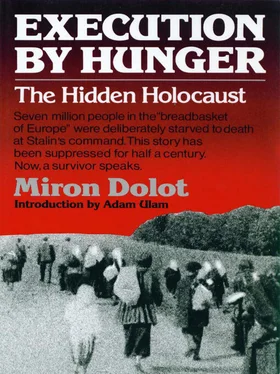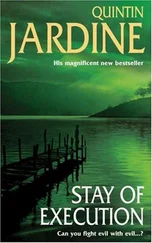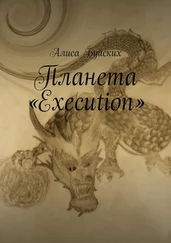Faced with starvation, the villagers tried everything possible to save themselves and their families. Some of them started eating dogs and cats. Others went hunting for birds: crows, magpies, swallows, sparrows, storks, and even nightingales. One could see starving villagers searching in the bushes along the river for birds’ nests or looking for crabs and other small crustaceans in the water. Even their hard shells, though not edible, were cooked and the broth consumed as nourishment. One could see crowds of famished villagers combing the woods in search of roots or mushrooms and berries. Some tried to catch small forest animals.
Driven by hunger, people ate everything and anything: even food that had already rotted—potatoes, beets, and other root vegetables that pigs normally refused to eat. They even ate weeds, the leaves and bark of trees, insects, frogs, and snails. Nor did they shy away from eating the meat of diseased horses and cattle. Often that meat was already decaying and those who ate it died of food poisoning.
WE COULDN’T help feeling that we were pawns in some lethal game. Each of our moves to escape death met with an official countermove; each of our measures to avert it was opposed with official countermeasures. In their opposition and retaliation against us, the officials often resorted to actions that would have been ridiculous but for their unbelievable sadism.
One of these which I still vividly remember was the campaign for the delivery of dog and cat skins to the state. Spring was already being heralded by nightingales singing in the flowering orchards. But this year it did not bring the usual joy to our people, for starvation had reached its culmination point. Since anything edible was being consumed by the villagers, dogs and cats had become a very desirable commodity. One such spring day we heard gunshots reverberating some distance from us. The sounds were coming from the east, and as the shooting approached closer, it was accompanied by the loud barking, whining, and yelping of dogs. At the same time, we heard some men shouting and laughing. This sounded very strange at a time when all the people in the village were downcast and silent. Suddenly, shots rang out in our own backyard, somewhere behind the barn, followed by the sound of a dog yelping and whining. We immediately recognized our dog, Latka. I ran out, and as I came to the place, I saw our Latka lying on the ground in a pool of blood, dead. Three gunmen stood beside her, looking down at her, talking and laughing. I broke out crying and tried to pet my dead dog. But my lamentations made no impression on the killers. One of them pushed me aside, took our Latka by her tail, and dragged her to the main road where a horse-driven cart already loaded with the bodies of other dogs and cats waited. Then all three of them mounted the cart and drove away. After a while, we heard the sounds of more shouting in the distance, and of animals crying out in their death throes.
Soon we had an explanation for this seemingly senseless slaughter of pets. Our village had received an order to deliver a certain quota of dog and cat skins. The requisition was addressed to the village hunters, even though not a single shotgun was left in our village after the confiscation of all guns. So, the problem now was how to fulfill this new quota? Help came from an unexpected quarter: the Thousanders! They benevolently decided to do the dog and cat hunting for us, although no one had asked them. Thus our village became the hunting ground for the Thousanders. All nine of them came to our village carrying their own shotguns, in addition to their revolvers, which we knew they always carried. The Thousanders started their hunting season without asking our permission or even informing us of their intentions. Beginning at the eastern end of the village and moving west, they systematically and indiscriminately shot each dog and cat they saw.
The carcasses of the poor dead animals were dumped in the main yard of the collective farm. But skinning them proved to be more difficult than killing them: it was a slow process because there were not many qualified skinners. The piles of carcasses were guarded by two men appointed by Comrade Thousander personally. It was rumored that he was concerned about the possibility of our starving villagers stealing them one by one. A week or more passed, and the carcasses still had not been skinned. The piles began decaying and emitting a foul smell. Finally, we heard that Comrade Thousander personally ordered and supervised the distribution of the carcasses to those who wanted them!! The carcasses were distributed in a matter of hours. Hunger is the best relish indeed, as the proverb says. The question remained as to what this campaign and its consequences meant to all involved. Did the government really need the skins of the dogs and cats? It might have. Yet, the officials were not in a hurry, it seemed, to skin the dead animals. Could it not have been a part of the general plan to starve the farmers into a complete submission to the government? The fact that the Thousanders came to our village armed with shotguns indicated that this campaign of dog and cat killings was planned and prepared ahead of time. Was the extermination of dogs and cats perhaps a means of depriving the starving farmers of one last possible source of food?
One day, at the beginning of 1932, an alarming piece of news spread: “They are killing the nightingales!” In Ukraine, the nightingale is a national symbol. A nightingale conjures up an image of the Ukrainian village with its orchards, fields, and whitewashed houses. Each village household claims one or two nightingale families in its orchard as its own. We used to listen to the singing of nightingales in our village like city folk listen to concerts. Nobody, not even mischievous boys, chasing other birds, would ever harm the nightingales. A legend handed down between generations of villagers asserted that the death of a nightingale would bring calamity to the household or estate in which the nightingale had died, or (if such a crime were conceivable) been killed.
But hunger is merciless, and it made the starving people merciless to any creature, including nightingales. Disregarding the legend, starving wretches started hunting nightingales together with other birds. Their nests were plundered of their eggs and their broods.
Like the dogs and cats, the nightingales also became prey of the Thousanders, even though this time there wasn’t any official campaign for them.
In the twilight hours or at dawn, we now heard shotgun blasts instead of the singing of the nightingales. In their hunt for the nightingales, just as in their extermination of our dogs and cats, the Thousanders were thorough and systematic. This time, they started in the village center. We heard that they split into two groups: one moved westward; the other eastward. In a few days they reached our place, and I had a chance to see them in action. They would stealthily and noiselessly approach a tree in which a nightingale was singing and wait for the appropriate moment. Then one of them would aim at his target and fire. There usually wasn’t a miss; they were skilled marksmen. For each successful shot the lucky hunter would be congratulated by his companions.
We watched this senseless nightingale hunt with feelings of helpless outrage. We could find some justification if a villager, half-demented by hunger, resorted to killing the beloved birds in his great despair. But there was no excuse for killing them in such a cruel, well-organized manner, and with such lightheartedness, as if for sport or target practice. In seeking an explanation for this newest exploit of the Thousanders, some villagers thought that it was an act of revenge of these city dwellers against us villagers. But then the question arose, revenge for what? We didn’t feel guilty of anything against them or the government which they represented. No matter how we tried, we could not understand what was going on.
Читать дальше












